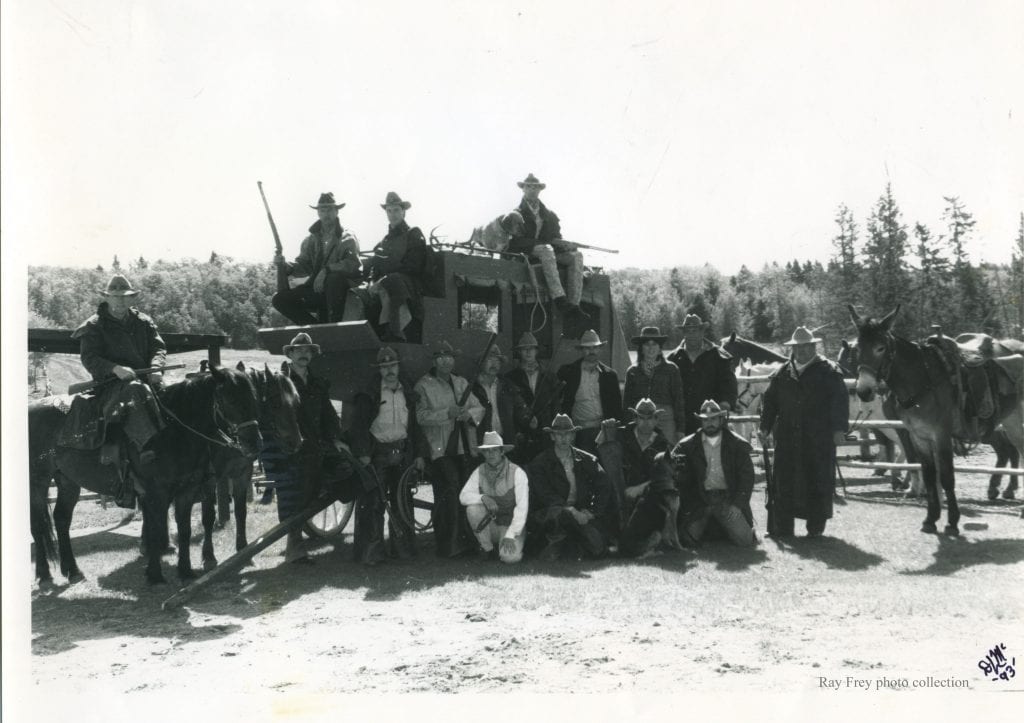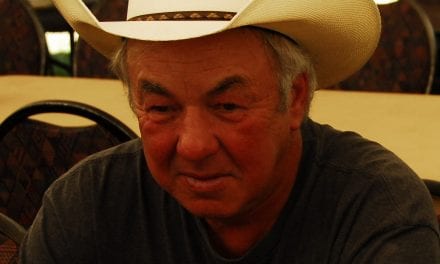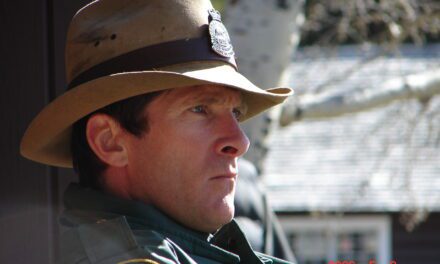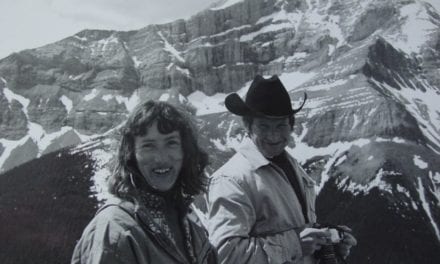(58:03) My wife is going to Winnipeg, her sister has a serious cancer, so Diane is going to go down at the end of August here before I go on my moose hunting experiences. I’m going to drive with the horses after Thanksgiving by myself. I just got a note from Marie (Nylund), the other day, that there is some kind of warden get together in Jasper on the 10th or 12th of October. And I’m thinking, I’m going to try and make that…
(59:20) I’ve seen Dale and Kathy and Rod Wallace and Donny Mickle. They were up here a couple of years ago. They hiked the Chilkoot Trail and we got together with them for a couple of evenings…and shared some war stories!
(59:47) Do you know Garry and Marlis Pollock by chance? He was a Minimum Service Officer with us in Riding Mountain. Then he went to Jasper as an Assistant Superintendent and then he was in Kootenay as an Assistant Superintendent with Darro, I think. Anyways, they’ve become quite good friends of ours. They’ve retired and they live in Turner Valley. We stop and visit them all the time on our way through. We spend a day or two before we cross the line heading to Arizona. Well who walks out across the street (one time), but John and Marie! They live right across the street from them. We had a good visit with them this spring when we came back. There was still snow up here when we came back in April and my son in law said, “You better just stay in Alberta for another week and let the snow go away because you will never get into your trailer. So we spent a week at Garry and Marlis’s and we had quite a few visits with John and Marie…My wife and I just after we retired always went over to Banff…Ian Syme was the Chief Warden then so he would give us horses and keys to the cabin. We’d leave from Lake Louise and end up in Ya Ha Tinda and the next thing you know we are at Stoney and working our way back to Banff and we’d do a ten day horse trip. We would always stop at Ya Ha Tinda for a day and I would get somebody who was coming from Banff to bring us some fresh meat and they would put it in the freezer and then we would have fresh meat for the last half of our trip. We always had a good visit with Marie and John (at the Ya Ha Tinda Ranch).
(1:01:44) It was interesting…when Marie just started the warden museum at the ranch. We just came from, I forget, one of the cabins…and it was hotter than blazes! We got to the Ya Ha Tinda and just kind of vegged out for a day or so. We were wandering around the ranch there, waiting for the weather to cool a little bit so Marie showed us the museum. I go to this museum, and I think I was still working then… and we used to have all these single lines or phone lines and all this insulators up in a tree. A single line going between cabin to cabin to cabin for 150 miles and we would spend more time cutting trees off this line and repairing phone lines. Well, she’s got all these phone lines and all these accessories that I used to make my living at in the museum. And I thought, “Maybe it is time for me to be in a museum! If now my tools are in there, what the hell am I doing still working?” So it was an interesting way to move on…
(1:03:33) One guy…when I worked at the ski hill was Darro Stinson. He and I became really good friends and we are still are even though he is in Australia or wherever the hell he is. I haven’t talked to him for a couple of years, but we both worked in avalanche control at Marmot Basin for several years. One thing… that just struck my mind here, is…we’d have to ski up on these ridges and drop bombs into cornices, or (shoot down) some of these slopes with the Howitzer…when the Avalauncher couldn’t reach…We had to go across some of these avalanche slopes and they were not safe places to be and I was always the first one across! He always said, “You go first…” because he said, after six years of shooting that 105 Howitzer, I was getting a little on the deaf side! We did all the ear protection and everything else, but I couldn’t hear the damn peeps! So he said, “You go across first because if you get caught in an avalanche, I can find you, but I know you can’t find me!” I will never forget that you know! I didn’t want to go across there in the worst case scenario you know, but I always did! Fortunately enough nothing ever happened, we got caught in a few little slides, but nothing serious…He wouldn’t go first because he could find me, but I couldn’t find him and he was probably right!
“Do you have any lasting memories as a warden? In terms of a favorite park or cabin?”
(1:05:35) I’ve always had a soft spot in my heart for my first district. That was the Smokey River district, behind Mount Robson. And I think the reason was because I was totally new. One thing we did back in the day, was we worked a shift that was 24 days in and four days off. You had to take a day off in the bush, which was kind of stupid because you still had to get up and find your horses and feed them and cut wood and do everything else that you would normally do and get paid for. But the 24 and four was a long shift and because we were so far back in the bush it didn’t make any sense to work a ten and four. As time progressed guys started working that ten and four and I know that they couldn’t have seen the places or done the things that they should have done simply because they spent too much time just traveling in and traveling out.
“How long would it take you to get in and out?”
Well, the first cabin, I always left from… the viewpoint at Mount Robson and it was a 17 mile day, the first day. And it was probably a 4000 foot elevation gain to get to the first cabin. I had nine cabins and each cabin was eight miles apart. The reason they were eight miles apart was because as it turned out was the distance you could snowshoe or ski comfortably in a day between cabin and cabin in the wintertime…so every seven or eight miles they would put a cabin up and that is sort of what kept them going in that respect.

Marv Millar on saddle horse. Riding Mountain National Park. Photo courtesy Ray Frey.
(1:07:32) One thing I didn’t mention about Riding Mountain…(that) was unique was when I got there, Ray Frey and I had 11 district wardens around the park. The purpose of the wardens was obviously law enforcement and to liaise with the local people in the smaller little farming towns , you know, Rossburn and McCreary and Gornel and some of these little towns that were on the outside of the park. The wardens became part of the communities. They weren’t (like) a warden from Banff, (where) you’d see one today and then you’d see another guy but he is totally different. (These district warden’s) kids went to school in those towns, they got their groceries in that town, the post office was there, they curled there, they played hockey there. They were part of the community and as a result of that a lot of the farmers (knew them). Like Blair Fyten for example came from Banff and he was at Baldy, that was the name of the station. He got really involved in the community and he would take holidays and go help farmers with their crops or put their hay up, you know and this kind of stuff. And as a result of that, when the farmers saw something going on or they saw something illegal happening like someone crossing their land to go into the park to go hunting or something, they wouldn’t hesitate calling Blair and telling him, “Somebody just went across my field. We were haying a couple of days ago and they had horses and they were looking like they were going to do some hunting.” So they just became invaluable with information because he had developed a rapport, and all of the guys did that. They developed a rapport with the locals and a trust sort of thing became very evident…But the cost of these outbuildings and barns, the little infrastructure on the boundary, they needed upkeep and this kind of stuff and they got expensive. So when somebody would move there always seemed to be pressure to close that station. I fought for five years to rob Peter to pay Paul to keep these stations going as long as I could…and Ray Frey was the same, trying to keep them going because we knew the value of them and once you let them go, you will never get them back…and if they sit vacant for a couple of years, they just start to fall apart and then you really got problems to try to build them up again, you know.
We tried to keep the wardens stations going, but you could see that it was a losing battle. As soon as somebody would retire, the next thing you know, “Well, we are going to close that station,” The administration and superintendents and assistant superintendents not being wardens, didn’t understand that. That you had to live in the community to be trusted and to be part of that community to know what was going on and (then) people would not hesitate to tell you something. Otherwise if they see you once in a blue moon and they don’t know who you are and they are not going to jump up and say, “Some guys just went into my field and are in the park hunting right now.” So when Blair…went back to Banff I think, they had a going away party at his place. It was a good contingent, most of the wardens were there and a couple of people from the park and everything, but there was probably 200 people from Rossburn, from the town who came out to say goodbye to him. I said, “This just proves that we are doing the right thing.” But unfortunately bureaucracy won’t help us keep doing that. Now, as we speak I think there are two warden stations left and both of them are historic sites, so they can’t get rid of them…the wardens don’t live there. I think biologists or someone lives there. But they have lost that community contact which is so, so important, especially in a place like Riding Mountain where access was anywhere. It wasn’t like the Trans Canada was your main access point. You can walk into that park, anywhere you want. So it is so important to do that (to be part of the community) and we fought for many years to keep it going and you could see the writing on the wall and eventually you just kind of retire or you move on…My theory is that in 20 years or something when Parks Canada comes back to the old days, if it comes back to the warden service of the old days is that they will ride into some of those vacant lots which are nice green spaces now and they will say, “This is a nice spot, we should put a warden station here!”
“Some people have said that, that maybe it will come around again.”
Well, that’s my thoughts and I hope it does and then I’ll be surprised, but that’s our vision I guess. If we’ve got any hope for the future of those places…
(1:13:37) I know that the animals, and the sheep in Banff and Jasper aren’t getting the protection that they used to get, you know, that they deserve. I’d be shocked if there’s not a lot poached, that nobody even knows about…especially those big rams that are so valuable and precious…some of those guys really want the big ones and I don’t think that the resources are there anymore to protect them, the way that they should be protected…but that’s water under the bridge, there is nothing I can do about that. If anything, makes me a little bit upset or a little bit bitter, it’s that kind of thing, that the wild sheep especially, I don’t think are getting the protection that they deserve. Even though we may not have caught that many guys, we (the wardens) were definitely a deterrent.
“You were definitely a presence in the backcountry.”
Yes, exactly. We were all over the place and you never knew where we were going to show up! I don’t think that happens anymore. But as I say, I don’t know that. Maybe it’s better than I think, but that just my perceived or warped vision…the fact that they got rid of the wardens and think they are going to get rid of the poachers? Somehow I don’t think that’s happened, but maybe it did, I don’t know…
(1:20:51) Well, you know and that’s the other thing with the warden service of the old days, it was a family…Yes, we had lots of disagreements and there were lots of guys that kind of fit on the edges, but generally speaking we were pretty strong. The thing that divided us was that cotton picking handgun issue. That was what divided the whole warden service and that was ultimately the end of us, was that issue. I sort of got caught in the middle of it there, but then I got moved on to a different project before I really got into it. But if anything bothers me about the history of the warden service it is that final coup de gras when the warden service was basically decimated and guys like Duane Martin, guys who put their life and soul into the warden service were unceremoniously retired with no dignity at all. That bothers me most of all. But other than that it was a tremendous career and I wouldn’t have changed it for the world…



